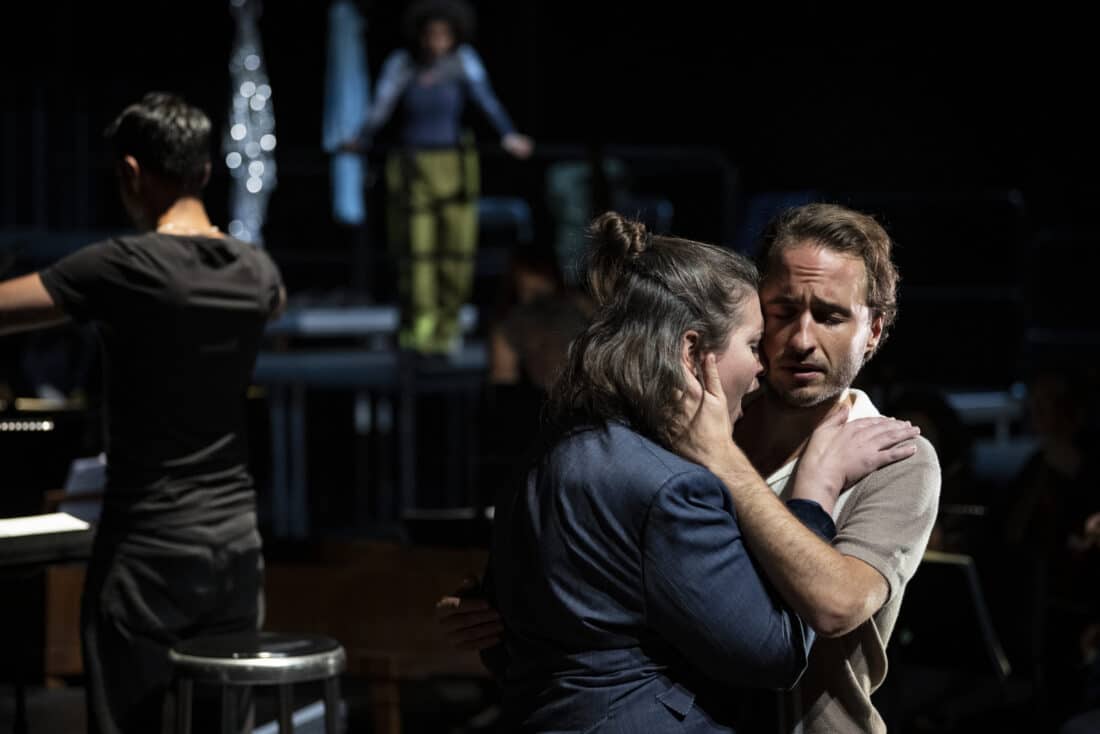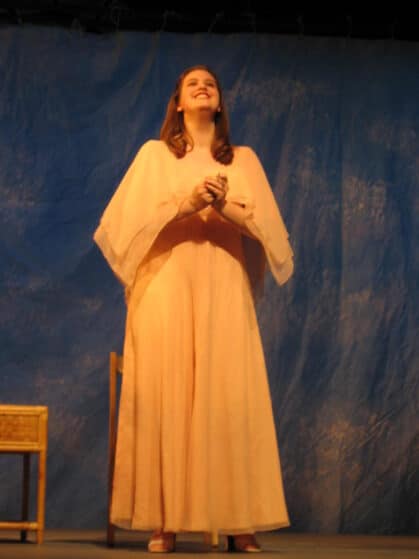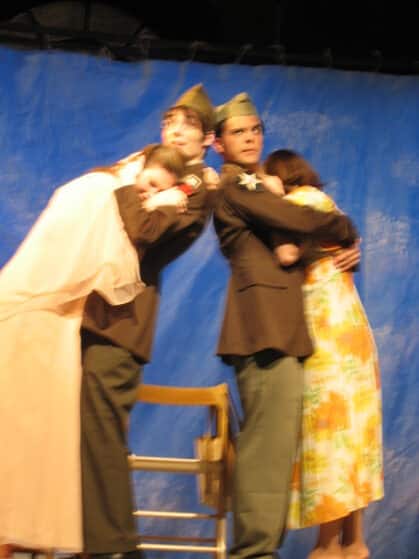Fior di Diavolo
Strongly founded! A marble tower!
With those words, arms splayed in a stock gesture of defiance, I launched into Fiordiligi’s first-act aria on a makeshift stage in the winter of 2004. That production, a Così fan tutte (in English) organized and performed by a bunch of over-caffeinated Harvard undergrads, gave me my first opera role—and my first taste of what it might be like to let music this thrilling channel through me while everyone else had to stop and listen.
It was heaven, it was a mess, and it was deeply formative. That Così, more than anything else, pushed me into serious singing training after college. It’s a miracle I got the chance at all; I was a choir nerd, not an opera queen, and my listening habits leaned toward polyphony, Bach, Weezer, Stravinsky, Joni Mitchell. I had no inkling of how legendarily difficult people considered the role. But my friend Jim, conductor of Dunster House Opera, knew I had a sneaky way with coloratura, and one day he pulled me into a practice room with a stack of scores. We sight-read through a dozen iconic Mozart arias that afternoon, and Come scoglio was by far the most fun: I blazed out the high notes and honked out the low, wiggled through the crazy triplets with abandon, and laughed in delight at the absurd melodrama. It was settled.
The production was scrappy, hormone-fueled, endearingly goofy. Our stage was the opposite of strongly founded: a series of squeaky platforms we assembled and disassembled each night at one end of the cafeteria. Costumes were whatever we could scrounge up from musty storerooms and our own closets. We had constant crushes on each other, usually unrequited but not always. I remember analyzing a sweet email from one of the orchestra violinists to my friend Brooke, the Dorabella; she wondered if he was actually asking her out. Years later, I sang Soave sia il vento at their wedding.
We cut the score down a lot—for length, but also to accommodate the performers’ abilities. Per pietà, Fiordiligi’s second-act aria, was too hard for the horns, Jim kept saying, so we left it out. I wouldn’t admit that it was also too hard for me, singing as I did with a choir-optimized voice. I had considerable agility and a little cut at the top, a fluttery unreliable vibrato that I mostly suppressed, and almost no resonance or control in the middle and low registers. No one outside of my kooky marble-tower community would have asked me to sing this music, but it didn’t matter. I listened to Elisabeth Schwarzkopf, copied her timing and inflections, and felt no pressure to be perfect. Singing opera would never again be so easy for me, so free of self-criticism.
(Don’t we all want to go back and shake our younger selves by the shoulders, saying: hey, that thing you’re doing? Enjoy it more, harder! You are luckier than you can possibly imagine.)
I identified with Fiordiligi. I lacked a boyfriend who sang about phoenixes and how beautiful I was, so I had to imagine that bit—but she was very like me in some ways I recognized, plus many I didn’t. We were probably about the same age: rather socially awkward, veering between unselfconscious enthusiasm and shy introspection. We were both self-effacing but smug, a little inclined to see things in black and white. We both reacted strongly to emotional currents, weeping easily in joy or disappointment. Neither of us could resist an appeal to compassion or pity.
Half my life later, I finally get to revisit this score and this woman. Living with her music and words and choices for those months in 2004 was more formative than I could ever have predicted—more formative than I knew until I dove back into the score this year.
—
Now, of course, music is my job, not my hobby, so I approach things in a different way. I’ve gotten smarter, more efficient, more sure of my body and my training in the twenty years since my first try. I’ve had to confront my own limitations (in work, in love, in everything) again and again, so it’s easier to be gentle with myself, to breathe through discouragement. My understanding of the range of human behavior has widened, and my sense of humor about it has developed; I’m not as quickly triggered as I was. Musically, this project feels like the realization of a dream that started in 2004: I get to explore the piece and the character with the splendid Orchestra of the 18th Century (who play with style, brilliance and softness for days), Manoj Kamps (who I entirely trust) at the podium, and a phenomenal cast of old and new friends. I know that my body and voice have grown at last into the capacity to meet the role’s fiendish challenges, to personalize them. After twenty years of waiting, I finally get to sing Per pietà! It all feels GREAT.
Still, I’m not bulletproof. You’d think that all my professional experience would insulate me from Fiordiligi-style emotional reactivity—but the spiky, impulsive version of myself that first sang this score is still in there, and she still pops out occasionally.
In one of our first rehearsals, I misinterpreted a suggestion from the director, Lisenka Heijboer Castañón, about a staging choice. I thought she asked me to cry, to really cry, at the end of Come scoglio, the fire-bomb aria of Act I—to allow Fiordiligi to be so overcome with the unfamiliarity of the sensations coursing through her body that tears would result… real Katharine-tears. I smiled warily and said I would try, but something silently flared up inside me, a huge upswell of emotion that I couldn’t immediately identify. I tried to push it down.
On the next pass, I worked myself into a frenzy on the final two pages of Come scoglio and burst into real tears during the playout, and then I couldn’t stop crying. It was awkward. None of my colleagues knew what was happening (the staging suggestion had been made privately). It took ages to collect myself, get on with the work, and reassure everyone that I was OK. Lisenka was horrified; she’d meant for me to act the scene with Fiordiligi-tears, not live it with my own. She felt guilty that she hadn’t been clear, but the misunderstanding was mine. I could have asked for more information, or more time—but just like Fiordiligi does, I paid more attention to what I thought was expected of me than to a sudden destabilizing feeling… hoping I could hide it, hoping that the emotional storm I felt gathering inside would pass quickly and silently.
I’m not afraid of vulnerabilty and genuine emotion onstage, but there’s a delicate line to walk between your character-body and performer-body, and crying for real tips you immediately off that line. It closes the throat and completely interferes with the functioning of the vocal mechanism. Still, I’ve done it a number of times in professional situations. Some directors and conductors aren’t interested in the fears (or boundaries) of their performers, and requests for vulnerability can sound like demands. They can also sound like genuine, open-ended questions about how to make good theater. I don’t necessarily blame anyone else for the moments that I’ve been tipped off-balance; my formal stage training was very minimal, so I’ve had to learn on the job how to handle myself. I do always want to allow as much of myself to show through the material as possible—emotional transparency is what I love most in performance—but it takes time to develop technical, practical tools for exploring triggering material in a way that’s both honest and safe. Those tools are rarely taught in a systematic way. Slowly, with many missteps, I’ve learned what requests can illuminate something beautiful or push me out of my comfort zone in a productive way, and what is inappropriate. Even more slowly, I’ve learned that I can say no or ask for specific support while I try something difficult.
Lisenka and I later cleared up our misunderstanding with no hard feelings. We changed our tack with Come scoglio to an approach that I can inhabit more securely in my own body. That conversation was long and valuable—about Fiordiligi, and how her sensitive points and my own overlap; about acting; about keeping the personal and the objective aspects of our artistic exploration balanced. As we talked, I realized that I do actually have various professional practices—developed erratically and individually, but developed nonetheless—for maintaining equilibrium. I wouldn’t have managed in this tough business for as long as I have otherwise. I’m not my character, much as we might share a history and certain personality traits.
—
So what’s so triggering about Fiordiligi? Many people find the character flighty, hysterical, only a little less weak than her sister. They find her music over-the-top, her arias too long, her huge registral leaps (written for a soprano who had an unusual facility for these—thanks, Mozart) comical and chicken-like. Many productions emphasize her extremity and then set her up as a hypocrite when, despite her protestations of moral high ground, she gives in to a new lover—fulfilling the misogynist expectations of the character Don Alfonso, the librettist Lorenzo Da Ponte, and Enlightenment philosophy in general. (Don’t even get me started on Rousseau. What a bastard.)
But her music, her glorious music! From the beginning, I thought Mozart was telling a deeper story than Da Ponte. Come scoglio was the aria that landed me the part, but Per pietà was the one I listened to over and over—as an impressionable 20-year-old preparing the role and many times since. I experienced quiet upheavals each time I lived its eight slow minutes, letting waves of undefined strong emotion pass through me. In my opinion, that astonishing aria remains the moral center of a murky story even today, no matter what the take is on this problematic opera—not because of Fiordiligi’s words necessarily, which are still full of stock 18th-century rhetorical devices, but because of the simultaneous vulnerability and conviction, fragility and strength revealed in the music itself. Mozart created a stunning realization of the search for rightness, one person’s vibrant feeling struggling against the wish to do no harm.
In this moment, I find Fiordiligi infinitely relatable. Is Per pietà about personal shame? I’ve known plenty of shame. Is it about searching for stillness, purpose, resolve? I know about nervous habits of fidgety excess, anxiety and overwhelm, and I know the rare, true moments they drop away. Is it about self-recrimination, about pointing feelings of ugliness and insufficiency inward? I know all too much about that. Is it about digging into the depths of the soul for resources you’re not sure you have? I’ve been there. Is it about finding solace—mentally and physically—in the slow gathering of gestures, starting from a bare E major arpeggio that gives security, then moving outward incrementally, increasing in fluency and tempo, finding first assurance and then thrilling apotheosis in perfectly-paced ripples that speed up the blood, deepen the breath, and redden the cheeks? … Yes, yes, yes.
Fiordiligi is like us. Most people don’t live out her storyline—our lovers don’t accept bets to test our fidelity; they don’t leave for an imaginary war and come back in thin disguises; we don’t fall instantly for people who sing sublime and silly music into our faces. (Not usually.) But nearly all of us have struggled to reconcile outward expectation with inward storms of unstable feeling. Most of us have wondered if the societal roles we play make sense. Most of us have spent eight miserable minutes alone at some point, wondering how to do the right thing and avoid hurting those we love. Most of us have been ashamed of our desires.
—
Twenty years into my life, I got to map some aspects of Fiordiligi onto myself in a rudimentary way, and vice versa. I was vocally and emotionally a child, like her—but a little less so by the end of the show, like her. Twenty years later, I get to revisit the piece with so much more understanding of myself, of human behavior, of professionalism, of Mozart, of singing. I find the character no less precious and moving now.
But there are differences. They reflect growth in myself, in my colleagues, and in the conversations we’re having more openly these days about gender disparity. In our production, we’re not focusing primarily on Fiordiligi’s shame. I’ve always thought of her fear of disappointing the expectations of society, her lover, and herself as the vulnerable essence of her character, expressed most gorgeously in Per pietà—but in this production, we’ve talked a lot about the deeper source of her outward dilemma, which is the heady, swirling, exciting conflict of sensation within her, much of it very good. That conflict and joy and curiosity is in her music, too.
In our Così, there are no disguises, only roles willingly played, though ugly realizations and bruised hearts still result. Releasing the contrivance of deception, looking for motivations behind the literal words the characters say, we’re teasing out different threads of Fiordiligi’s interior life than I’m used to considering: her desire, her pleasure, her anger. Women universally experience these feelings, but from the Enlightenment until now, their expression is usually discouraged. Toward the end of the piece, a raging Guglielmo calls her Fior di diavolo—flower of the devil! A gentle note from Lisenka after a run of the show reminded me that my/Fiordiligi’s reaction to this insult should have no hint of shame. I sit at the front of the stage, silent but unapologetic, slowly realizing that I needn’t hold myself to a different, higher standard than the boy I thought I loved who’s now acting like an unreasonable ass. What freedom. Così fan tutte—may we all be like that. May we all allow ourselves to fall off our own externally-imposed pedestals and see what it’s like down on earth, rather than in heaven.
What makes Fiordiligi so rich to explore, and what makes the life of a singer so fulfilling (when it is), is that none of these feelings are off-limits. They’re part of a larger story. If the cost of examining them honestly is occasionally losing our shit in rehearsal, occasionally getting it wrong or meeting with an unsympathetic audience, that’s not the end of the world. We can map the feelings in the practice room; we can experience them through the channel of someone else’s sublimely beautiful music; we can come to our own understanding of how they manifest in us; we can develop that understanding with others; we can physicalize the feelings (in sound, in motion) with our bodies for other people to experience. None of us are perfect; we’re all always learning. Maybe we get to do this work with friends, with people we trust, with people whose singing and playing thrills us anew every performance. Maybe we get to revisit the material at different stages of life and see, in the piece, how we’ve changed.
I can imagine my future self—maybe another 20 years down the road—wanting to shake my present self by the shoulders and say: hey, that thing you’re doing? Enjoy it more, harder! You are luckier than you can possibly imagine.




Fidelma Farinas-Cobas
October 12, 2023 at 2:21 amLoved every sentence, my dear. You are a master of the stage and the pen (keyboard?)
Emily Pollock
October 12, 2023 at 1:30 pmThis was great and so well written. Long live the Dunster House Opera. I’m so glad I was in the pit for this show in 2004.
Marisa Green
October 13, 2023 at 3:35 pmMe too, even though those viola parts were all too often…the opposite of exciting. Something about putting on a high talent/low budget opera in your dining hall sums up why I wanted to go to Harvard in the first place, and one of my favorite memories of the place.
Gwen Thompson
October 13, 2023 at 10:22 pm“May we all allow ourselves to fall off our own externally-imposed pedestals and see what it’s like down on earth, rather than in heaven.” THIS!!